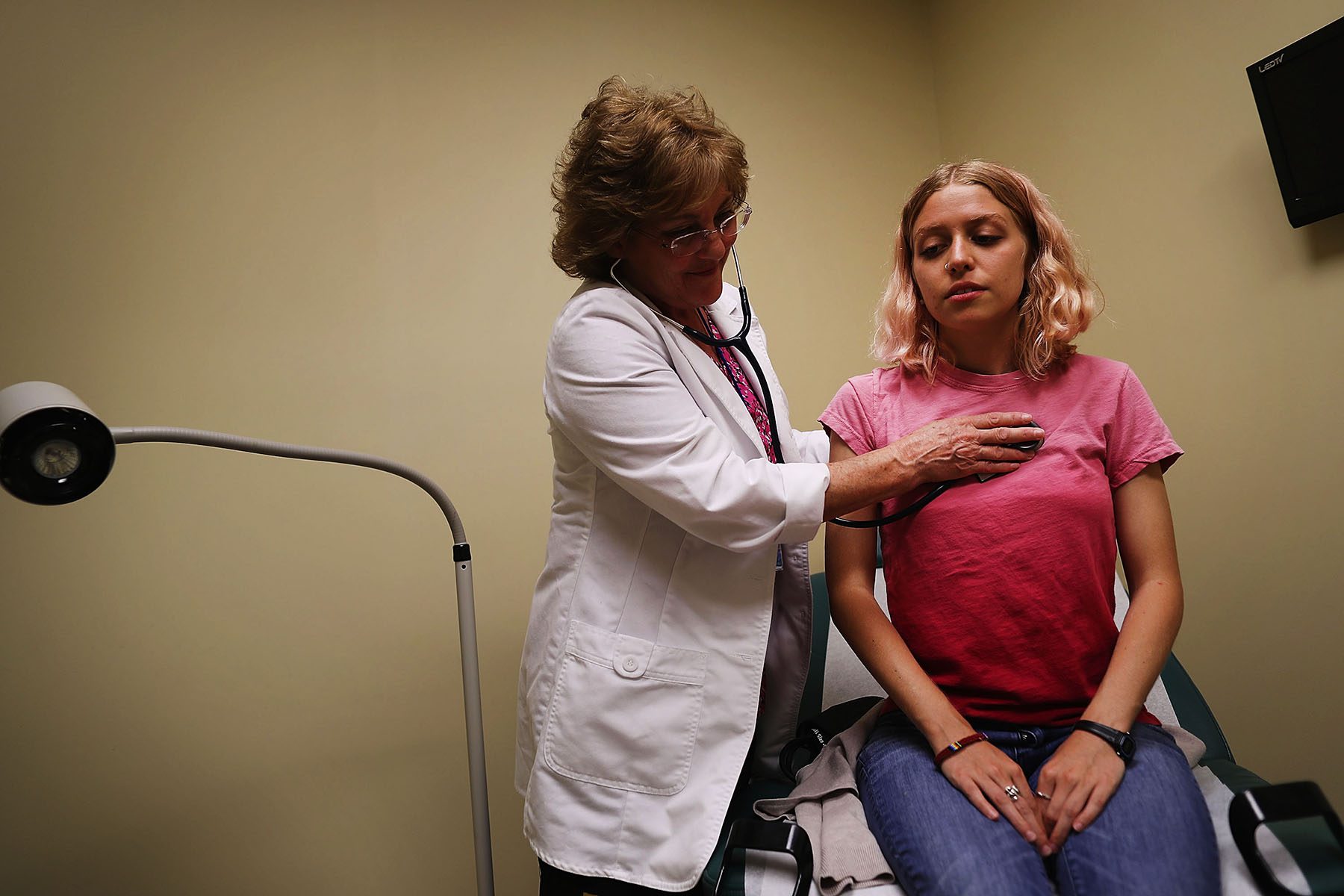The day after Senate Bill 8 went into effect in Texas, President Joe Biden announced a “whole-of-government effort” to address the new law severely limiting abortion access, specifically calling on the Department of Health and Human Services and the Department of Justice to take action. Now that help is starting to reach Texas. The Department of Justice sued the state in an attempt to block the law, and the Department of Health and Human Services is now poised to distribute $10 million to help invest in contraception access in the state.
The choice to increase funding for Title X — the federal government’s family planning grant — is significant. It aims to provide increased emergency contraception, one of the key reproductive health services left in the state, and potentially aid in key family planning infrastructure that the state has chipped away at for years.
“We are telling doctors, and others involved in the provision of abortion care, that we have your back,” Secretary of Health and Human Services Xavier Becerra said in a statement at the time of the HHS announcement, two and a half weeks after the law took effect.
SB 8 effectively banned abortion after six weeks and outsourced enforcement of the law to private citizens, who can sue anyone they suspect has been involved in aiding or abetting abortions past that point. Every Body Texas, the state’s Title X administrative body, told The 19th that “many” of the clinics in its network have seen an increase in demand for contraception and emergency contraception since SB 8 took effect.
The funding is being dispersed in two allotments. The first is to Every Body Texas. The second will allow any family planning provider, whether they are a current Title X grantee or not, to apply for funding to be used for family planning and contraception services to aid those directly impacted by SB 8. Both existing recipients and new funding applicants should have dollars in hand from HHS by October.
Matt Thompson, the interim Title X director of Every Body Texas, told The 19th that as soon as SB 8 went into effect in Texas on September 1, the group was in communication with HHS to figure out how the federal agency could best help support Texans.
“The thought process we’re working through is if we increase access [to family planning] in response to SB 8 and focus on emergency contraception, we can help prevent unintended pregnancy before people reach the point of needing an abortion, since that’s now so limited in the state,” Thompson said.
Thompson also said that Every Body Texas is focused on utilizing this increased funding to expand the Title X network in the state, which he said has “big gaps where these services are needed.”
Currently, there are 36 subrecipients of Every Body Texas, operating 175 clinics across the state. Thompson says that though clinics have seen increased demand for contraception, SB 8 isn’t on the radar for many of their patients. Three-quarters of the people using Title X clinics fall below the federal poverty line. Those clients aren’t zeroed in on legislative dealings, Thompson said, but rather “focus on everyday life on top of the pandemic — these patients are just taking care of the things their family needs to work.”
Still, Thompson also points out that many of the providers in the state’s Title X network are the sole health care provider for their patients, so it’s more important now than ever for people to be able to access their preferred birth control method through those clinics.
Because Title X is not a fee-for-service funding situation, the new dollars allocated through the HHS announcement will go directly to patient care: stocking clinics with long-acting reversible contraceptives like IUDs and implants, paying providers to provide clinical care, amping up staffing.
These patients are just taking care of the things their family needs to work.
Matt Thompson, the interim Title X director of Every Body Texas
“The more dollars we can put into the network, the more patients the network can serve,” Thompson said.
Money allocated by the Texas legislature for the state’s family planning program, separate from federal Title X funds, typically runs out eight to 10 months into the year, leaving many unable to get the contraceptive care they need in a timely manner. That underfunding is key to understanding how SB 8 came about: The Texas legislature has spent a decade destabilizing and underfunding family planning services, refusing to expand Medicaid and facing pregnancy-related death rates above the national average. The numbers are even more severe for Black women, who constitute just 11 percent of live births but 31 percent of pregnancy-related deaths in the state.
To fully understand what is happening with Texas abortion access, experts on reproductive health care suggest first looking back a decade to what happened with family planning in 2011. Kari White, a principal investigator at the Texas Policy Evaluation Project (TxPEP) at the University of Texas at Austin, pointed out that the state legislature cut its own family planning budget by two-thirds that year.
When the 2011 state cuts happened, the legislature opted to send the state family planning dollars to providers that didn’t specialize in contraceptive care. The reason for doing so? To kick Planned Parenthood out of providing family planning services in Texas. Though Planned Parenthood clinics typically make up less than 10 percent of publicly funded family planning clinics nationally, they provide a disproportionate amount of this kind of care, being the source of contraception dispensing and counseling for a third of all people who access it. All of this ultimately resulted in the closure of over 80 family planning clinics in the state and a major decline in the use of long-acting reversible contraceptives like IUDs and injectables, the most effective forms of contraception. As a result, more children were born in counties where Planned Parenthood clinics no longer served as Title X providers.
In 2013, what is now Every Body Texas was awarded the state’s Title X family planning grant from HHS’ Office of Population Affairs, which allowed it to allocate those dollars outside of the confines of how the state legislature had directed — but it took time to rebuild some of the services that had been cut so drastically by the state. Fewer experienced family planning providers were available for low- and no-cost care. Even as funding began to increase, services offered simply weren’t as robust as they once were, especially as non-specialized family planning clinics — that is, other health care centers that provided more general forms of health care without a specific focus on contraception counseling and dispension — continued to receive the bulk of state dollars.
The decade that followed this major hit to family planning services in Texas coincided with the state’s investment in what are widely known as crisis pregnancy centers, mostly religiously-affiliated businesses that often provide no actual medical services but seek to refer pregnant people — some of whom are under the impression that they are at an abortion clinic — for prenatal care and dissuade them from choosing abortion care. But many of those who end up at CPCs are there because they have no alternative — it is the place funded by the state that they can go to for care related to anything having to do with pregnancy. They typically offer free urine-based pregnancy tests, ultrasounds, and counseling on access to prenatal care and adoption agencies. Many CPCs also offer things like free diapers and maternity clothing. Critically, they also are places where patients can get a pregnancy verification form needed for Medicaid and SNAP enrollment. Texas has 203 CPCs compared with just 19 abortion clinics. With the passage of SB 8, a CPC might also be the only place a pregnant person has easy access to get the official documentation for confirmation of pregnancy needed to enroll in Medicaid.
While increased Title X funding won’t make it to health care providers until at least six weeks after SB 8 first took effect in Texas, Thompson said it’s needed to directly help those who now can’t easily access abortion care. He added that when Every Body Texas informed the providers in its network about the new federal funding, the immediate reaction was relief coupled with hope.
“People were grateful to see that HHS was doing something, taking some sort of action to respond to SB 8,” Thompson said. “I think that it actually made people feel a bit hopeful that other players are willing to step up and do something about SB 8.”







